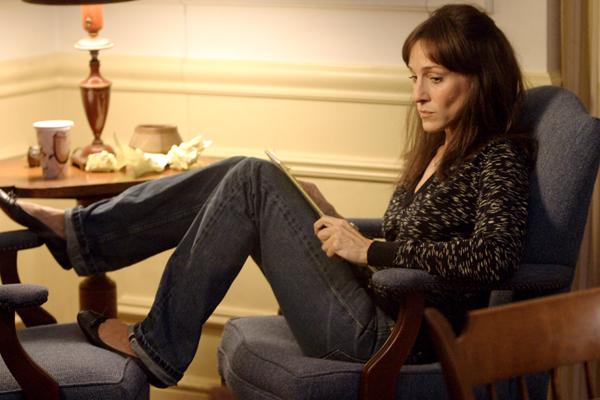|
Reviews of Recent Independent, Foreign, & Documentary Films in Theaters and DVD/Home Video

SPINNING INTO BUTTER It’s good for a movie, play, book, or any work of art to be about something—except when it becomes a Movie, Play, Book, or Any Work of Art That is About Something. Rebecca Gilman’s 1999 play Spinning Into Butter is About Something, namely racism. Since it was first produced, it has been a popular choice on college campuses and other theaters around the country because it Provokes Debate. Again, this is something that should be provocative, but if we are all honest with ourselves, it can also be a bit wearisome. This is particularly true when plays are converted to film. Dialogue that seems sharp and satirical on stage can sound awkward onscreen. Flat characters that act as props to move the story along in a play feel just ludicrously flat when presented in close-up in a movie’s realistic setting. The 2007 screen adaptation of Gilman’s play, then, comes unavoidably equipped with a set of baggage that is hard to shake. The story has been expanded—characters are added and campus scenes replace the mostly interior setting of the play—but its stage origins are still apparent, and as I watched, I had to wonder if the story is more effective onstage, where satire sits more comfortably. Or at least I hoped that was the case. Here’s the story: Sarah Daniels (Sarah Jessica Parker), the new dean of students at Belmont College, a small, competitive liberal arts college in rural Vermont (think Bennington), is called to help when a black student begins to receive threatening, racially abusive notes. The clumsy attempts to be racially sensitive by the higher-ups in the college administration (who are pointedly all white) make the situation worse, sparking campus wide anger and forcing to the surface the unspoken divide between the majority white students and the various groups of students of color (that’s what one student tells Daniels they want to be called). The whole bowl of soup is here—overly sincere but clueless liberals, minority students who are angry about being labeled as such, students of color who feel they are ignored or treated differently by white students, and white students who feel that the different ethnic groups purposely keep themselves separated. Yup, it’s all here. Throughout it all, Daniels is presented as the voice of reason, the one person who can see through the inadvertent hypocrisy. She develops a friendship with Aaron Carmichael (Mykelti Williamson), a black reporter who has been sent to cover the story. But as they become closer, she finally admits her own complicated, negative feelings about race in a monologue that has, no doubt, hit the infamous casting directors’ lists of “Audition Monologues That We are Tired of Seeing.” The trouble with the movie is that as Gilman layers problem on top of problem, each twist makes the whole thing feel more and more contrived. If you have the same question that I had as I watched—why is only one black student on campus, a seemingly shy freshman who keeps to himself, the sole target of the inflammatory notes and symbols (yes, of course, there is a noose)—then you don’t have to work too hard to guess what the final revelation will be, one that is seemingly meant to show that racism is a problem that is almost impossible to deal with because, as was pointed out in the sprightly song from the musical Avenue Q, “Everyone’s a Little Bit Racist.” Deglamorized with no makeup and dark, straight hair, Parker acquits herself admirably enough with a role that sometimes feels more like a device than a person. As Simon Brick, the student who is the target of the racial attacks, Paul James convincingly handles his one big scene, which is good, because the scene itself is rather unconvincing. Accomplished theater director Mark Brokaw does well enough. He’s not asked to do a lot more than show the pretty campus in a lovely, autumnal light and let the camera run as the characters debate. I don’t
mean to be too hard on this film. As I said, art should attack important
issues, and anything that engages people in discussion can’t be that
bad. But as I watched the movie make fun of people who are sincerely but
awkwardly trying to handle a difficult situation, I felt that the dog
was chasing its own tail a bit, because isn’t this movie trying to do
the very same thing?
Kirsten Anderson
|

